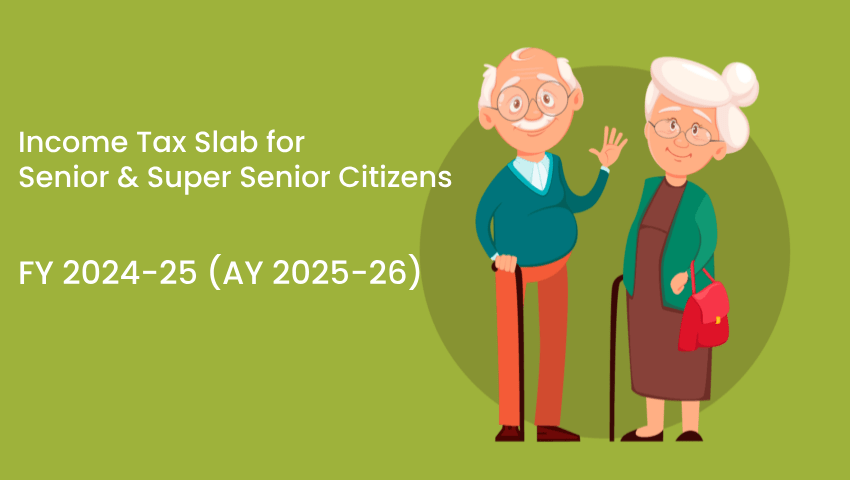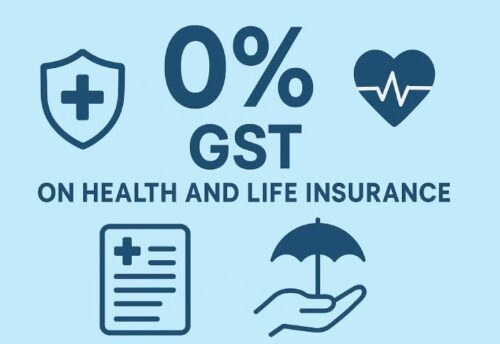
- 16/05/2025
- MyFinanceGyan
- 5762 Views
- 2 Likes
- Tax
Income Tax Slab for Senior and Super Senior Citizens – FY 2024-25 (AY 2025-26)
The Government of India offers special income tax provisions for resident senior citizens (aged 60–79 years) and super senior citizens (aged 80 years or more) under the old tax regime. However, under the new tax regime, the same tax slab applies to all individuals regardless of age.
In this article, we explain the income tax slabs applicable to senior and super senior citizens for FY 2024-25 (AY 2025-26) under both old and new regimes, along with key benefits, deductions, and filing criteria.
Who is a Senior and Super Senior Citizen?
As per the Income Tax Act, 1961:
- Senior Citizen: A resident individual aged 60 years or more but less than 80 years.
- Super Senior Citizen: A resident individual aged 80 years or more.
Note: Age is considered as ‘attained’ on the day before the individual’s birthday. For instance, if someone turns 60 on 1st April 2025, they are treated as 60 years old on 31st March 2025, making them eligible for senior citizen tax benefits in FY 2024-25.
Income Tax Slabs for FY 2024-25 (AY 2025-26):
Old Tax Regime – Senior Citizens (Age 60 to 79 years):
Old Tax Regime – Super Senior Citizens (Age 80 years and above):
New Tax Regime – Applicable to All (Including Senior & Super Senior Citizens):
FY 2024-25 (AY 2025-26)
FY 2025-26 (AY 2026-27) (as per Budget 2025)
Key Tax Benefits for Senior and Super Senior Citizens:
Higher Basic Exemption Limit (Old Regime Only):
- Senior Citizens: ₹3,00,000
- Super Senior Citizens: ₹5,00,000
- Others: ₹2,50,000
Standard Deduction:
- ₹50,000 from pension/salary income (Old Regime)
- ₹75,000 (from FY 2024-25 onward) under the new regime
Section 87A Rebate:
- Old Regime: No tax if income ≤ ₹5 lakh (₹12,500 rebate)
- New Regime: No tax if income ≤ ₹7 lakh (₹25,000 rebate)
Medical Insurance Premium (Section 80D):
- Deduction up to ₹50,000 (Old Regime only)
Treatment of Specified Diseases (Section 80DDB):
- Deduction up to ₹1,00,000 (for senior citizens and above)
Interest Income Deduction (Section 80TTB):
- Deduction up to ₹50,000 for interest from savings, FDs, post office (Old Regime)
Exemption from Advance Tax:
- If not earning from business/profession
Reverse Mortgage Benefits:
- No capital gains tax on receiving payments from reverse mortgage scheme
Senior Citizen Savings Scheme (SCSS) – Section 80C:
- Deduction up to ₹1.5 lakh (Old Regime only)
- Regular and higher interest payout
Income Sources Common for Senior Citizens:
- Pension
- Bank or Post Office Interest
- Rental Income
- Capital Gains
- SCSS Interest
- Reverse Mortgage Proceeds
When is ITR Filing Not Required?
Frequently Asked Questions:
Yes. However, those aged 75+ with only pension and interest income from the same bank are exempt if Form 12BB is submitted.
- ITR-1: Pension, rent, or other income (non-capital gain)
- ITR-2: If capital gains are included
Yes, super senior citizens (80+) can file ITR-1 or ITR-4 offline.
Yes. A standard deduction of ₹50,000 is allowed.
Yes. Interest up to ₹50,000 is deductible under Section 80TTB.
Up to ₹50,000 under Section 80TTB (Old Regime)
No. They are taxed as per general slabs (₹2.5 lakh exemption).
No. Only resident individuals are eligible.
- Listed shares (<1 yr): 15% under Section 111A
- Listed shares (>1 yr): 10% under Section 112A
- Unlisted shares (<2 yrs): Slab rate
- Unlisted shares (>2 yrs): 20% with indexation
No, except:
- Section 80CCD(2) – Employer NPS contribution
- Section 80CCH – Agniveer Corpus Fund
Conclusion:
Tax planning is vital for senior and super senior citizens to utilize available exemptions and deductions effectively. Opting for the most suitable regime—old (with deductions) or new (with lower rates)—can significantly reduce tax liability. Filing ITR on time ensures compliance and access to financial and legal benefits.



